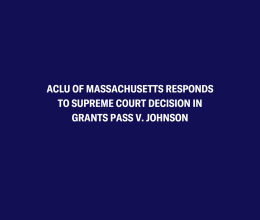
The following statement in response to the Massachusetts Supreme Judicial Court ruling in Commonwealth v. Henry may be attributed to Jessie Rossman, a staff attorney with the ACLU of Massachusetts:
"Today, the Massachusetts Supreme Judicial Court held that a judge must evaluate a criminal defendant's financial circumstances before determining how much she must pay in restitution to the victim of her crime. This ruling echoes the Court’s recent holding in Commonwealth v. Magadini, where the Court held that a homeless man who trespassed on private property to seek shelter from the deadly cold could argue a defense of necessity. Together, these two unanimous decisions confirm that people in Massachusetts cannot be jailed for being poor.
"Ms. Kim Henry was ordered to pay thousands of dollars in restitution to Walmart, even though she had no home, no income, and no job prospects. By requiring her to pay a sum she could not afford, the sentencing judge set Ms. Henry up for failure. When an indigent defendant fails to pay restitution, she faces the prospect of fees, detention, or even arrest. As the Court recognized today, 'Burdening a defendant with these risks by imposing restitution that the defendant will be unable to pay violates the fundamental principle that a criminal defendant should not face additional punishment solely because of his or her poverty.'
"Ordering a defendant to pay restitution she cannot possibly afford is not only unfair to the defendant, but also useless to the victim and costly to the Commonwealth. The Court’s decision is a victory for everyone, as it ensures that judges will craft restitution orders that defendants can comply with and that the Commonwealth can enforce."
Click here for more information about the case and to read the ACLU of Massachusetts amicus brief.






